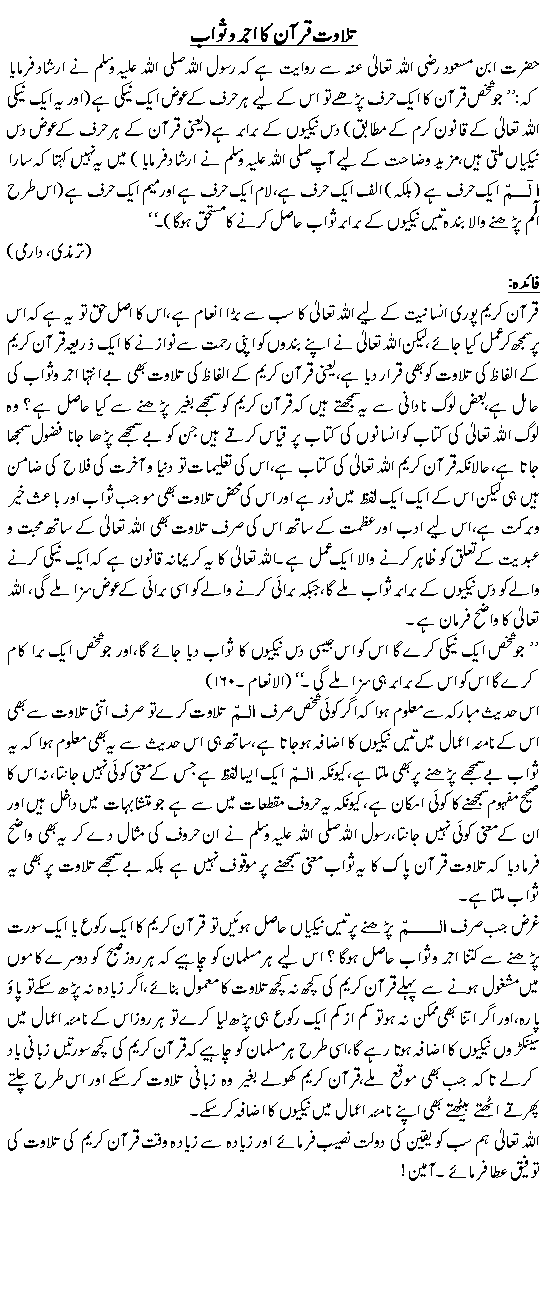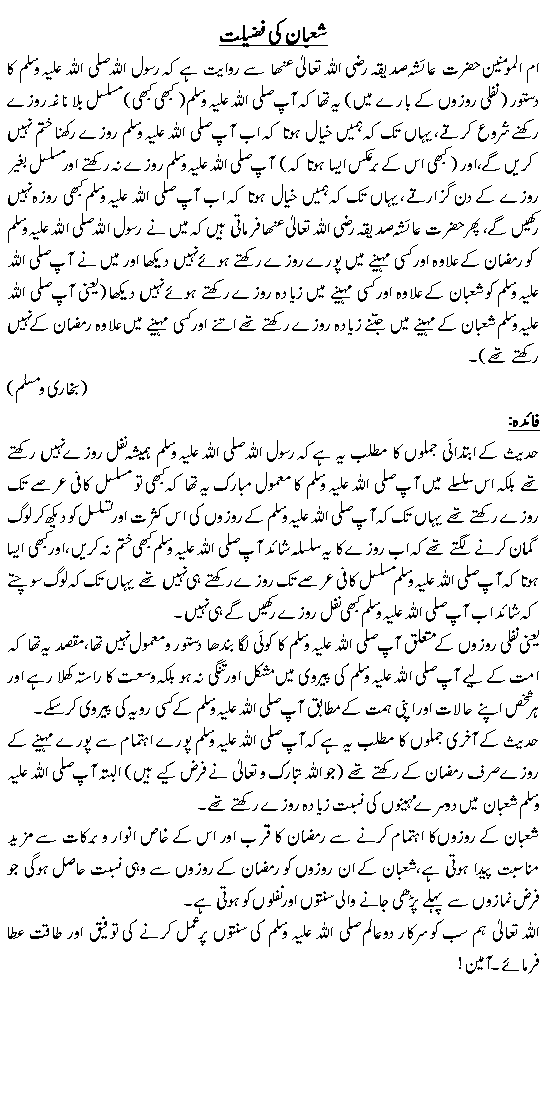
Seeking Refuge With Allah
Seeking Refuge with Allah – Tafsir Ibn Kathir – Surah Fatihah
“Authu Billahi min-ash Shaytani Rajim”
(I seek refuge with Allah from the cursed Satan)
“I seek refuge with Allah from the cursed Satan so that he is prevented from affecting my religious or worldly affairs, or hindering me from adhering to what I was commanded, or luring me into what I was prohibited from.
Indeed, only Allah can prevent the evil of Satan from touching the son of Adam. This is why Allah allowed us to be lenient and kind with the human devil, so that his soft nature might cause him to refrain from the evil he is indulging in.
However, Allah required us to seek refuge with Him from the evil of Satan, because he (satan) neither accepts bribes nor does kindness affect him, for he is pure evil. Thus, only He Who created Satan can stop his evil.
This meaning is reiterated in only three Ayat in the Quran. Allah said in Surat Al-Araf: “Show forgiveness, enjoin what is good, and turn away from the foolish (i.e., don’t punish them).” [Noble Quran 7:199]
This is about dealing with human beings. He then said in the same Surah: “And if an evil whisper comes to you from Shaitan, then seek refuge with Allah. Verily, He is Hearing, Knowing” [Noble Quran 7:200]
Allah also said in Surat Al-Muminun: “Repel evil with that which is better. We are best acquainted with the things they utter. And say: “My Lord! I seek refuge with You from the whisperings (suggestions) of the Shayatin (devils). And I seek refuge with You, My Lord! Lest they should come near me. [Noble Quran 23:96-98]
Further, Allah said in Surat As-Sajdah: “The good deed and the evil deed cannot be equal. Repel (the evil) with one which is better, then verily he, between whom, and you, there was enmity, (will become) as though he was a close friend. But none is granted it (the above quality) except those who are patient, and none is granted it except the owner of the great portion (of happiness in the Hereafter, i.e., Paradise and of a high moral character) in this world. And if an evil whisper from Shaitan tries to turn you away (from doing good), then seek refuge in Allah. Verily, He is the Hearing, the Knowing” [Noble Quran 41:34-36]
The Tafsir of Istiadthah (seeking Refuge)
These are the only three Ayat that carry this meaning. Allah commanded that we be lenient human enemies, so that his soft nature might make him an ally and a supporter. He also commanded that we seek refuge from the satanic enemy, because the devil does not relent in his enmity if we treat him with kindness and leniency. The devil only seeks the destruction of the Son of Adam due to the vicious enmity and hatred he has always had towards man’s father, Adam. Allah said:
“O Children of Adam! Let not Shaitan deceive you, as he got your parents (Adam and Hawa (Eve) out of Paradise)” [Noble Quran 7:27]
“Surely, Shaytan is an enemy to you, so take (treat) him as an enemy. He only invites his Hizb (followers) that they may become the dwellers of the blazing Fire.” [Noble Quran 35:6]
“Will you then take him (Iblis) and his offspring as protectors and helpers rather than Me, while they are enemies to you What an evil is the exchange for the Dthalimun (polytheists, and wrongdoers, etc.)” [Noble Quran 18:50]
The devil assured Adam that he wanted to advise him, but he was lying. Hence, how would he treat us after he had vowed:
“By Your might, then I will, surely, mislead them all. Except Your chosen servants among them (i.e., faithful, obedient, true believers of Islamic Monotheism).” [Noble Quran 38:82-83]
Also, Allah said: “(So when you) want to recite the Quran, seek refuge with Allah from Shaitan, the outcast (the cursed one). Verily, he has no power over those who believe and put their trust only in their Lord (Allah). His power is only over those who obey and follow him (Satan), and those who join partners with Him.” [Noble Quran 16:98-100]
Khadejah Jones
Char Qabil Ibrat Auratain

Char Qabil Ibrat Auratain
The Dream Of Hadrat Abu Bakr Siddique Radi Allahu Ta’ala Anhu
Hadrat Abu Bakr Siddique Radi Allahu Ta’ala Anhu was a merchant before the advent of Islam and once traveled to Syria on business. While there, he had a dream in which he saw the sun and the moon descend from the sky and fall onto his lap. He took hold of them, placed them against his chest, and then stored them in a sheet. In the morning, he met with a Christian priest and sought an interpretation of the dream.
The priest asked him, “Who are you?”
“I am Abu Bakr, a resident of Makkah.”
“Which tribe are you from?”
“The Banu Hashim.”
“And what’s your means of livelihood?”
“Business.”
The priest then said,
“So listen carefully: The Final Prophet, Muhammad (Peace and Blessings of Allah be Upon Him), has arrived, and he is from your tribe. If it weren’t for him, Allah wouldn’t have created the Earth, the Heavens, or even another prophet. He’s the leader of whatever came first and whatever comes last. O Abu Bakr! Soon you’ll join this deen and become both a minister and a viceroy of it. This is the dream’s interpretation. Listen too, that I’ve read the praise of this Prophet in the Torah and in the Bible, and I’ve already brought Iman upon him and accepted Islam – only I haven’t revealed this yet to the Christians out of fear.”
Hearing this, the love for the Holy Prophet began to grow within Hadrat Abu Bakr Siddique Radi Allahu Ta’ala Anhu, and he immediately headed back to Makkah, looked for the Holy Prophet (Peace and Blessings of Allah be Upon Him), and cooled his eyes with his blessed sight.
The Prophet SallAllaho Alaihi wa Sallam saw him and said, “Abu Bakr! You’ve come. Now quickly enter the religion of truth.”
Hadrat Abu Bakr respectfully replied, “Fine, but I’d like to see a miracle.”
The Prophet SallAllaho Alaihi wa Sallam said, “Whatever you saw in Syria, and its interpretation by the priest, was solely my miracle.”
Hearing this, Hadrat Abu Bakr replied,
صدقت يارسول الله انا اشهد انك محمد رسول الله
You’ve spoken the truth, and I testify that Muhammad is the Messenger of Allah.” [Jami’ul Mu’jizat, Page 14]
Lesson: We see that Hadrat Abu Bakr Siddique Radi Allahu Ta’ala Anhu is a true Khalifa of Islam, and also that nothing of the happenings of the world is unknown to the Beloved Prophet (Peace and Blessings of Allah be Upon Him). We also come to know that had it not been for our Beloved Prophet (Peace and Blessings of Allah be Upon Him), nothing else in this world would have been created!!
Shaban Ki Ahmiyat Aur Fazeelat

Shaban Ki Ahmiyat Aur Fazeelat
A Cold Breath Of Jahannam
Last week, it was extremely cold…. cold beyond imagination. It was so cold, they said these were temperatures we havent seen in more than a decade. Pipes froze and burst, many people lost electricity and many even died. There was ice everywhere…ice on the cars, ice on the trees, ice on the on the grass. When the arctic wind blew, it cut through to the bone. It hit across the face and numbed whatever it touched. And as I felt the chilling effects of these below-freezing temperatures, I thought of Jahannum.
Yes, Jahannum.
Now, why would I remember Jahannum, one might ask, in this Siberian weather?
Isnt Jahannum fiery, burning and hot?
Yes. But, although Jahannum is a place known for its unimaginable heat, scorching blazes and sweltering fires, there are also places within it that are extremely cold, frigid and chilling.
So frigid are these places that it would burn and scorch and torture a person just as the severest fire would and worse.
And this extreme state of coldness in Jahannum is called Zamhareer.
The state of the Hell of Zamhareer is a suffering of extreme coldness, of blizzards and freezing for the people who will enter Jahannum. (May Allah protect us from it).
Yet, its coldness is not a pleasure or a relief to the sinners. Rather, it is a severe punishment and burning torture which no one would ever be able to bear.
Ibnul Qayyim said about the following Ayah: “Nothing cool shall they taste therein, nor any drink. Except boiling water, and Ghasaaqaa” [Al Naba: 24-25]
It is Zamhareer, it burns them with its freezing just as it burns them with its heat. Mujaahid and Muqaatil also stated that it is the peak of coldness. (Badaai al Fawaa-id)
Allah mentions this Zamhareer when he talks about the rewards of the people of Jannah and how they are saved from its cold torture, its extreme frigidity, and biting frost.
”They will recline on thrones. They will not see the excessive heat of the sun, nor the extreme bitterness of cold (Zamhareera).” (Surah Insan:13)
And the Prophet (Sal Allaahu Alaiyhi wa Sallam) said: “The Fire says: Master, some of me eat other parts, so grant me a breath (respite). Thus (the Fire) was granted a breath in the summer and a breath in the winter. So whatever you find of bitter cold or Zamhareer, thus it is from a breath of Jahannum, and whatever you find of heat or Haruur, thus it is from a breath of Jahannum”. (Muslim)
So what did the righteous people do when they experienced freezing winters and low temperatures?
They remembered this hadeeth and asked Allah to protect them from Jahannum and its bitter cold as well as its severe heat.
Ibn Rajab said: “And from the virtues of winter is that it reminds one of the extreme cold of Hell and pushes one to seek refuge from it…”
So when winter comes along and the arctic wind blows and temperatures drop, use it as a reminder for the Aakhirah.
When your fingers and toes are so cold and numb that you can no longer feel them and when you shake and shiver in the frigid weather, remember Zamhareer and its bitter coldness.
These winds, these extremes of temperatures, this ice and snow are signs amongst the signs of Allah. They are reminders of our life to come and of the Aakhirah.
So seek refuge in Allah from Jahannum and its heat and its coldness. Do all you can to stay away from it and do all you can to protect yourself from it. And never forget the Day when you will stand in front of Him and give an account of all that you said and did.
The famous worshipper Raabiah said: “I have never heard the adhan except that I remember the caller who will announce the Day of Resurrection, and I never see the falling snow except that I imagine the flying pages of the records of peoples deeds (on that day), and I never see swarms of locusts except that I think about the Great Gathering on the Last Day.” (Sifah Al-Safwah)
And Sufyan ibn Uyaynah said that Ibrahim at-Taymee said: “I imagined myself in the Hellfire with its iron chains and blazing fire eating from Zaqqoom (a tree in hell with exceedingly bitter fruit), and drinking from its Zamhareer (a bitterly cold drink), so I said, ‘O my soul, what do you long for?’
It replied, “To return to the world and perform a righteous action, by which I will be saved from this punishment”.
I also imagined myself in Paradise with its Hoori dressed in silken garments (of Paradise) with gold embroidery.
I said “O my soul! What do you long for?”
It said, “To return to the world and perform a righteous action by which this reward will increase.” So I said to myself, “You are in the world and (surrounded by) aspirations”.
O Allah, we seek Your refuge from the torment of Jahannum, from its Zamhareer (coldness) as well as Haruur (heat). Ameen.
- January, 15
- 145
- Paradise-Hell
- More
Quraysh Ka Taruf

Quraysh Ka Taruf. Quraysh Kay Bare Mein Ahadith
Diseases Are A Part Of Our Test
Narrated Abu Sa’id Al-Khudri (Radi Allahu anhu), that Prophet (SalAllahu alaihi wasallam) said, “Do not abuse my companions for, if any one of you spent gold equal to Uhud (mountain) in Allah’s Cause, it would not be equal to a Mudd (two third of a kilogram) or even a half Mudd spent by anyone of them.” Sahih Al-Bukhari 5:22
Diseases are a part of our test
Diseases are one of those things in our lives that remind us of how weak we truly are. Our perfectly protected bodies can be severely impaired by a tiny bacterium or a virus that is invisible to the naked eye. Actually, a little thinking will make us understand that it is surprising for our bodies to be so heavily affected by a bacterium. This is because Allah created our bodies with flawless protection systems, especially our immune systems. It can be comfortably called a ‘strong army’ fighting against the enemies of our body. However, despite all these protective systems, humans can’t help but fall ill very frequently. This should make us understand that Allah could have created us in such a way that we would never get ill. Viruses and bacteria would not affect us at all, or these tiny ‘enemies’ specially prepared would not have existed at all. However, any person, at any time, can find themselves struggling with a health problem for no apparent reason. For example, one virus entering the body through a small cut on the skin can spread throughout the body in a short amount of time. No matter how advanced the technology is, the simplest virus can overpower us very easily.
These are not far-fetched scenarios; they can happen to anyone at any time. This should make everyone ponder these facts thoroughly. Just like all other weaknesses, diseases are also specially created by Allah for us. Man tends to be arrogant and conceited, forgetful of his weaknesses. These diseases help man see and understand his weaknesses and also see the true, undesirable nature of this life.
Istiqbal Shaban ul Muazzam

Istiqbal Shaban ul Muazzam
The Best Act Of Worship: Humility
“Aisha (Radi Allahu Anha) said: “People are paying no attention to the best act of worship: Humility.”
Collected by Ibn Abee Shaybah (13/360) Ibn Hajr graded this Athar as being Saheeh.
Benefits for this subject:
At-Tabari (may Allah have mercy on him) said: “Allah tests His believing servants with humility to see how they obey Him and follow His commands.”
[ Saheeh Bukhari Ibn Battal ]
Shaykh Abdur Rahman As-Sa’dee (May Allah rest him in Jannah) said, “Humility and Humbleness are among the foundations of the religion and its core, whereas pride contradicts Islam.
The origin of humility is found in the verse: (سَمِعْنَا وَأَطَعْنَا) (We hear and obey) [ Al-Baqarah 285].
This means we hear what you have said, our Lord in the Quran, and what Your Messenger has said.
Humility and pride are two distinct traits that aren’t hidden from anyone. Let’s look at the differences between the two:
The humble person submits to the truth, no matter who it comes from. He doesn’t care about his old views, speech, or position. He aids the truth whenever it becomes clear to him it’s right.
The arrogant, stubborn one clings inflexibly to his speech, actions, and ways. In fact, he has a high opinion of his speech and deeds. When the truth is made clear to him, he turns up his nose arrogantly, as he’s amazed with himself. Having this trait lowers a person to a very low status.
The person with humility spreads the greetings of peace to the young and old, to those of high status and low. He treats everyone the same.
The conceited person doesn’t give salaams or even look at the needy and poor. He has no concern for their needs, and he won’t even intermingle with them.
The humble individual is loved by Allah and His servants. He is always close to good and distant from evil, sin, and transgression.
The arrogant one is hated by Allah and His servants. He is always distant from piety and righteousness and close to evil, sin, and transgression.
Humbleness is a quality of the Prophets and Messengers. This attribute is for the God-fearing and Guided. Arrogance is a characteristic of the tyrants and oppressors.
Humility increases a person’s nobility and raises his status until he eventually reaches the ranks of those loved and pleased by Allah. How many humble people attain love and charity! How many times is a person with humility praised! How often do people supplicate to Allah for a modest man!
On one hand, there isn’t a humble person to Allah, except that the Most Merciful raises his rank. On the other hand, there isn’t an arrogant person except Allah lowers his status [ Majmu’ As-Sa’dee vol 22/ 150-153]
Translated and compiled by Abu Aaliyah Abdullah ibn Dwight Battle

